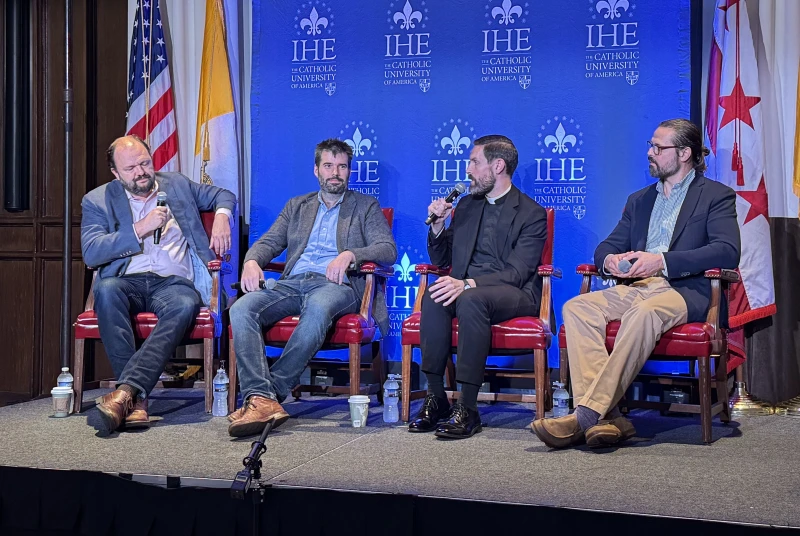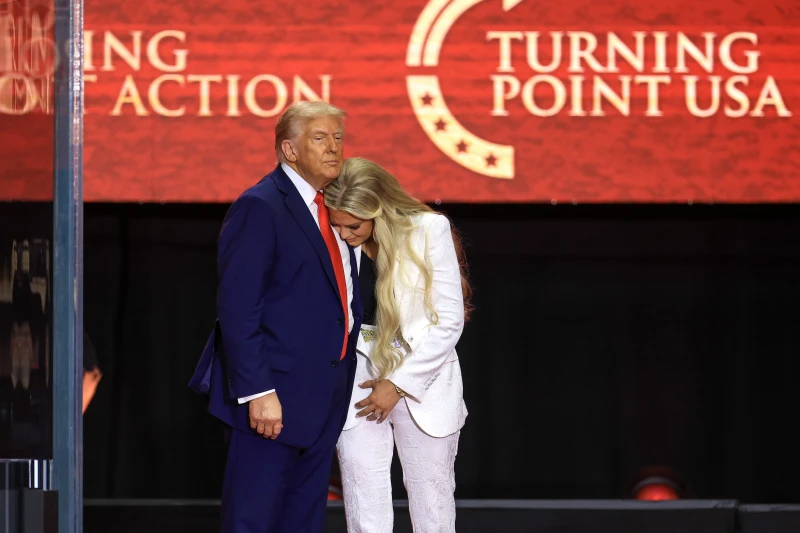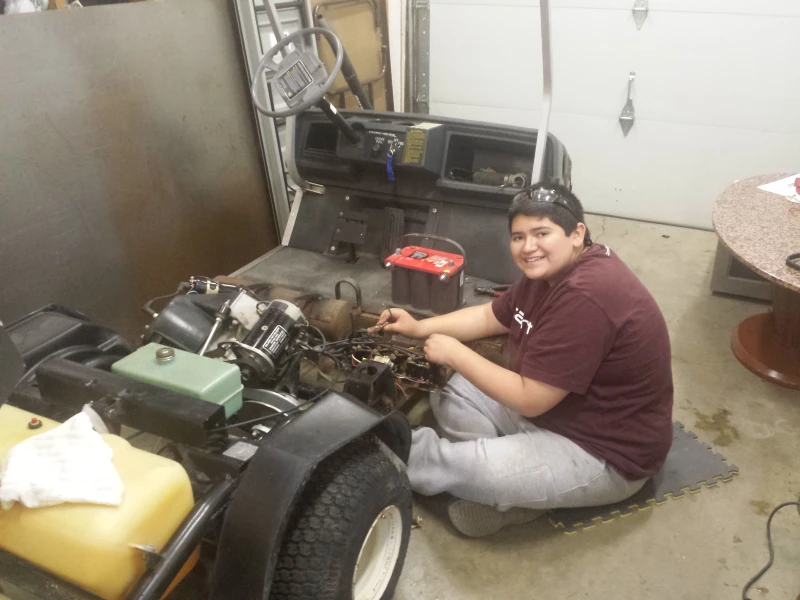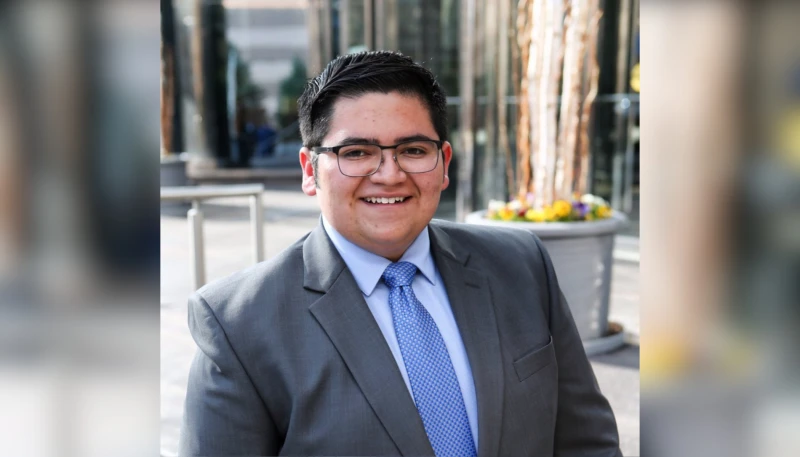

From left: Ross Douthat, media fellow at the Institute for Human Ecology; Will Wilson, CEO of AI company Antithesis; Father Michael Baggot, LC, professor of bioethics at the Pontifical Athenaeum Regina Apostolorum in Rome; and Brian J.A. Boyd, director for the Center for Ethics and Economic Justice at Loyola University New Orleans discuss AI and the Church on Sept. 23, 2025, at The Catholic University of America in Washington, D.C. / Credit: Tessa Gervasini/CNA
Washington, D.C., Sep 25, 2025 / 07:00 am (CNA).
The Catholic University of America (CUA) hosted a panel this week to discuss how Christians should think about the developing technology surrounding artificial intelligence (AI).
The Sept. 23 panel was hosted by CUA’s Institute for Human Ecology, which works to identify the economic, cultural, and social conditions vital for human flourishing. The group discussed the threats posed by AI, the future of the technology, and the Church’s place in the conversation.
Ross Douthat, media fellow at the Institute for Human Ecology, led the discussion between Father Michael Baggot, LC, professor of bioethics at the Pontifical Athenaeum Regina Apostolorum in Rome; Will Wilson, CEO of AI company Antithesis; and Brian J.A. Boyd, director for the Center for Ethics and Economic Justice at Loyola University New Orleans.
Douthat asked the panelists what they each believe to be the greatest threat of the emerging technology as it poses new challenges to the defense of human dignity, justice, and labor.
According to Boyd, the potential loss of human connection is the most prominent threat of AI. He said: “To be human is to be created in and for relationships of love — by love of God. Our nature is made to be receptive to grace.”
AI becomes an issue if “our main relationship and reference point is talking to a computer rather than to humans,” Boyd said. “I think that is an existential threat, and something worth discussing.”
“If we’re habituated to look at the screen before we look at our neighbor … and AI is [the] constant reference point, it will make habits of prayer much more difficult to include. It will make it harder to learn to listen to the voice of God, because the answer is always in your pocket.”
Baggot said his greatest concern is that “artificial intimacy is going to distract us from, and deter us from, the deep interpersonal bonds that are central to our happiness and our flourishing.”
“Companies now grip not only our minds but also are capturing our affections,” Baggot said. “We can all read about these tragic cases of exploitation and manipulation that are only going to continue unless we put proper guardrails in place and also provide the information that allows us to have the kind of deep interpersonal relationships we were made for.”
While many people worry that AI could create “mass unemployment,” Wilson said he disagrees: “I think that this is a very silly fear because human desires and human wants are infinite, and therefore, we always find new things for people to do.”
Rather, Wilson shared his concern that humans will no longer create their own ideas and will lose their intelligence and knowledge.
“The trouble with AI is even if it’s not actually intelligent, it does a very good simulacrum of intelligence, and it’s very tempting to use it to substitute for human intelligence,” Wilson said. “It’s very possible that we’re entering a world where very soon any cognitive labor, any reason, [or] any thought will be a luxury.”
Catholic AI
While there are dangers to AI, Baggot addressed the positive aspects the tool can offer, highlighting the benefits of Catholic AI companies.
“I’ve been privileged to work on the Scholarly Advisory Board of Magisterium AI, which is basically a Catholic answer engine that’s very narrowly trained on reliable documents, magisterial documents, [and] theological texts,” Baggot said.
Magisterium AI is a “system designed to give people reliable responses to their questions about the Catholic faith,” Baggot explained. “This is appealing to Catholics who want to go deeper, but it’s also quite appealing to people who have never really had the chance, or aren’t quite ready, to speak to another human person about their curiosities regarding Catholicism.”
Baggot explained that creators of the technology work hard to keep it from being “anthropomorphic” to avoid users confusing the AI with actual connection. He said: “We do not want people having an intimate relationship with it.”
While Magisterium AI can provide useful information, Baggot acknowledged that it is not a tool for spiritual direction. He said: “Spiritual direction … should be with another living, breathing human being who actually has insight into human experience [and] who can develop a relationship of real empathy and real compassion.”
The Church’s place in AI
The panelists had differing viewpoints about the Church’s place in AI and how Christians should approach it. Wilson said he believes “the conversation about where the technology is going and what we’re going to do with it is happening among people who do not care … what any Christian church has to say on the topic.”
“It’s actually a little hard to blame them because Christians have basically sacrificed their place at the forefront of science and technology, which is where we were in centuries past,” Wilson said.
“Control goes to those who can deploy the most capital, and capital gets allocated very fast to people who are able to deploy very efficiently. And by and large, those people are not Christians because Christians aren’t really trying.”
Baggot said that while AI does pose dangers, the Church “has a lot of insight and wisdom” that can help guide the conversation. “The Church is in a privileged position to leverage its incredible patrimony, its reflection on the human person, [and] human flourishing.”
“The Church has reflected a lot about the meaning and value of work, the subjective value of work. It’s not just about economic efficiency, but it’s about how I use my own God-given talents to grow as a person and then also to serve others in intrinsically valuable activities.”
Read More






